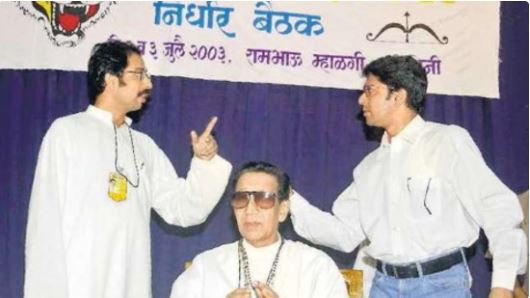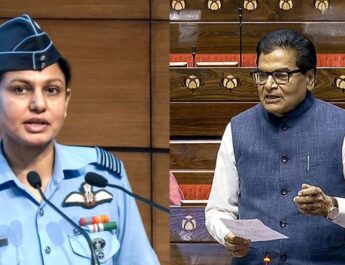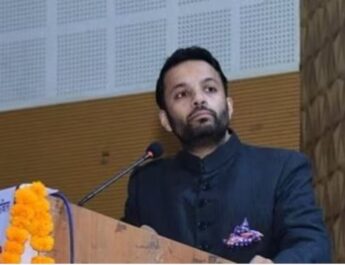Mumbai: Hours after a podcast featuring Raj Thackeray gained significant attention online, the official X account of Shiv Sena (UBT) shared a video in which Uddhav Thackeray, Raj’s cousin, expressed his readiness to overlook minor disagreements for the greater good of Maharashtra. The video, presented in a split-screen format, captures Raj and Uddhav shaking hands outside the Thackeray family residence, Matoshree.
This video encapsulates the sentiments within both Uddhav’s Sena (UBT) and Raj Thackeray’s Maharashtra Navnirman Sena (MNS), reflecting a blend of optimism and skepticism.
The cousins, who were once prominent figures in the Shiv Sena, have been fierce adversaries for the past thirty years. Should they decide to reunite politically, it could signify a significant shift in Maharashtra’s political landscape, which has already been unsettled by the divisions within both the Shiv Sena and the Nationalist Congress Party in 2022 and 2023.
This marks the most serious discussion of political reconciliation since the cousins parted ways when Raj established his MNS in 2005-06.
The context surrounding these developments is noteworthy. Recently, there has been intense debate regarding the Mahayuti government’s decision to mandate Hindi as a compulsory language in all primary schools across Maharashtra. Opposition parties, including the MNS, have voiced their objections to this policy. In light of this, the Thackeray cousins are likely to emphasize the importance of Marathi pride as the civic elections approach later this year.
These elections, particularly in Mumbai, could be crucial for the political future of the Thackerays. The BJP is intent on securing control of the Mumbai civic body, a stronghold for the Shiv Sena for many years. Deputy Chief Minister Eknath Shinde, who currently leads the Shiv Sena, has been actively working to undermine the Sena (UBT) in Mumbai, having welcomed over 50 former corporators from the Thackeray faction into his party thus far.
A potential alliance between Sena (UBT) and MNS could significantly alter the political dynamics. The striking visual and emotional connection between the two cousins campaigning together has the potential to influence the Marathi electorate and affect the civic elections, not only in Mumbai but throughout the extensive and affluent Mumbai Metropolitan Region, as well as in traditional strongholds like Nashik and Pune.
A triangular election scenario may emerge in Maharashtra, as both the Sena (UBT) and MNS are unlikely to collaborate with the opposition Maharashtra Vikas Aghadi (MVA) alliance. With votes potentially divided among multiple parties, the BJP-led Mahayuti may encounter more challenges than it initially expected.
A significant challenge
Leaders from both factions acknowledge that reuniting is more complex than it appears. Numerous obstacles must be addressed, including concerns about the sustainability of such an alliance without it deteriorating again.
The core issue remains the trust deficit between the two leaders, which continues to be a significant concern.
“MNS has attempted to establish an alliance with Uddhav Thackeray’s party on two occasions, in 2014 and 2017. Each time, he initially expressed interest but subsequently ceased communication,” stated MNS leader Sandip Deshpande. “Any collaboration must be unconditional; we cannot accept restrictions on who we can welcome into our coalition.”
A senior leader from Shiv Sena (UBT) highlighted a major practical challenge: “Who will take the lead?” he questioned. “Will Raj accept Uddhav’s leadership, and vice versa?”
Political analyst Padmabhushan Deshpande noted that Raj is also in discussions with the BJP and Shinde regarding a potential alliance for the upcoming civic elections.
“There is also the matter of the MVA, of which Shiv Sena (UBT) is currently a member. Will Uddhav exit the MVA, or will Raj join it? It seems improbable that the two cousins would both be part of the MVA. However, in the event of a triangular election, can the two cousins secure victory in the Mumbai civic polls solely based on the Marathi vote?” Deshpande remarked.
Is the past truly behind them?
How profound is the trust deficit?
“Before the 2017 civic elections, Raj did propose a partnership with Uddhav. However, Uddhav was in power alongside the BJP at that time and viewed the civic elections as a chance to undermine Raj’s party. He opted to proceed independently. The Shiv Sena secured only 84 seats, 20 less than before.” The BJP secured 82 seats. Uddhav gained power with the BJP’s assistance and subsequently attracted six of the seven winners from the MNS. Since that time, Raj has placed even less trust in Uddhav, according to a former MNS legislator.
A Sena (UBT) MP noted that Shinde had dinner with Raj at his home just three days prior. “How can we believe his statements in a podcast that was likely recorded shortly after this dinner?” he questioned.
The rivalry between the cousins has, at times, become quite personal.
In the lead-up to the 2017 civic elections, Raj publicly claimed during a rally that Bal Thackeray, the founder and leader of Shiv Sena and Uddhav’s father, was dissatisfied in his final days. “I visited him once and noticed he was being served oily batata wadas. I returned home and prepared his favorite dish for him,” he recounted.
More recently, during last year’s Assembly elections, Raj anticipated that Uddhav would refrain from fielding a candidate against his son, Amit Thackeray, in the Mahim constituency. After all, when Uddhav’s son, Aaditya Thackeray, contested for the first time in 2019, Raj had chosen not to run a candidate against him. However, Uddhav’s Sena (UBT) did nominate Mahesh Sawant in Mahim. In that three-way contest, Sawant emerged victorious, with the Shiv Sena candidate finishing second and Raj’s son Amit placing a distant third.
“We believe Raj has not forgiven his cousin for the embarrassing defeat of his son. Therefore, everything is viewed with skepticism,” remarked the Sena (UBT) MP.
“At the end of the day, anything can happen in politics,” he continued, “but the two cousins will need to shed a lot of their past grievances if they genuinely intend to collaborate.”




